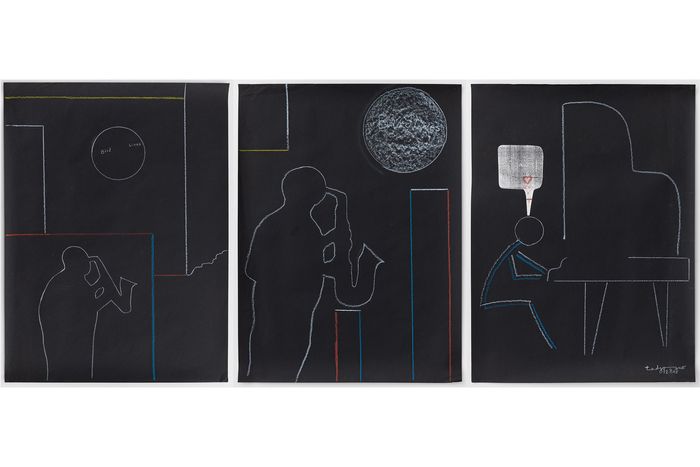
When Ted Joans was 10, his aunt fished Parisian Surrealist magazines from the trash of the affluent white home where she worked as a maid. Prohibited from learning another language in his Jim Crow school, he mowed lawns to buy a French dictionary and translated the texts she’d brought home for him. His introduction to formal Surrealism, he would later write, confirmed what he already knew as a Black American and parishioner in the church of jazz.
Born on July 4 in 1928 to a family of riverboat entertainers, Joans was an artist and poet who imagined his often playful work as “hand grenades” to “explode on the enemy and unhip.” Invested in the Black American struggle and Third Worldist liberation, he traveled widely, living in Timbuktu and Tangiers and jumping between the Beat scene in Greenwich Village and Parisian Surrealist circles. In 2003, he died in Vancouver, having sworn off living in the U.S. after the acquittal of the NYPD officers who killed Amadou Diallo.
His visual art is not yet as well known as his poetry, but it was a consistent practice across his life, expressing a similarly righteous critique of our world and imagining a marvelous new one into being. Appreciation for it has increased quickly amid the art world’s post-BLM reckoning, especially after his work was included in the Met’s landmark 2021 “Surrealism Beyond Borders” show, which helped expand and popularize the perspective, once articulated by the historian Robin D.G. Kelley, that “Surrealism may have originated in the West, but it is rooted in a conspiracy against Western Civilization.” Now, a selection of his paintings, collages, drawings, and sculptural assemblage are on view at Zürcher Gallery’s “Jazz Is My Religion” — his first solo show in New York since 1977.
Though Joans emerged in the earliest wave of Beats — frequenting the Beat Hotel with Allen Ginsberg and William S. Burroughs — he is often left out of the whitewashed popular narrative of the movement. Or, as he put it, “I’m the Crispus Attucks of the Beat Generation.” This erasure is especially egregious, since the Beats’ hipster stylings drew heavily from a proximity to Blackness and imitation of jazz musicians. While Joans was writing free-verse Surrealist imagery like “the naked beard makes sounds of dogs barking” and “the moon is pregnant with loud poems,” he offered “rent-a-beatnik” services to uptown squares, delivering poetry and jazz like a court jester with beret and bongos.
Beat poetry’s Surrealist aesthetic, Joans felt, was also borrowed from Black culture. Though his mentor André Breton, the leader of the Parisian surrealist movement, praised him as “the only Afro-American Surrealist,” Joans is in fact a vital figure in the long tradition that Amiri Baraka called “Afro-Surrealism,” an aesthetic whose increased recognition is still upending the notion that the style was mainly about Europeans dreaming of dripping clocks. One of Joans’s best known works is an “exquisite corpse,” the Surrealist style of collaborative drawing, carried out over three decades by 132 artists, writers, and musicians. (The conceptual artist David Hammons even turned it into his own film.) “Jazz Is My Religion,” along with other exhibitions of Joans’s work this year at the MoMA and in Europe, a solo show in Virginia, and an upcoming biography, are a step toward correcting the record on his importance.
The highlights of the Zürcher show (and, indeed, of Joan’s entire body of work) are his Bird Lives! pieces, which showcase many of Joans’s stylistic signatures, including collage, uncanny silhouettes, wordy intrusions, and an ecstatic jazz spirit bursting forth from the canvas. Bird was the nickname of Charlie Parker, the innovative bebop saxophonist and Joans’s roommate, whom Joans first memorialized in oil paint shortly after his untimely death in 1955. When Joans learned of Parker’s passing, he and his friends took the subway in every direction, scrawling “Bird Lives!” in charcoal on sidewalks and walls. The heartfelt aphorism soon swept the city with analog virality, blanketing the sidewalks in word art more than a decade before graffiti took hold in New York. Like all of the work in the Zürcher show, the Bird Lives! iterations on display are from the ’90s and 2000s, nearly half a century after he first began the series.
A collage-heavy version from 1998 fills out Bird’s hulking, bearlike outline with unusually detailed limbs and a photo cutout of Parker, turning him into something like a jazz centaur. Its swirling cacophony of rectangles — red, blue, lime — are staggered so as to leap off the page, exuding the freedom at the core of the Technicolor music. There’s a hint of the colorful Dutch abstractionist Piet Mondrian, whose work was itself inspired by the boogie-woogie he heard in New York. Another avian piece from the following year busily overlays a label-heavy scrap of cardboard box with the “Bird Lives!” silhouette and Joans’s name in Japanese characters. Within the figure, “Charlie Parker” is written over and again, like a Bart Simpson chalkboard punishment. Even at the end of his life, Joans was still trying to learn the lessons — the weird blues transcendence — he heard in jazz.
Owing in part to his constant financial precarity, Joans often used found materials; the Zürcher show includes an image inked on a worn cutting board and a series of drawings done on Trader Joe’s bags with the visible wrinkles of a real-life grocery run. In several, Joans appears as a bagged traveler, his glasses perched atop his crown, as if he’s looking with his mind rather than his eyes. The pieces in the Trader Joe’s series have the character of quick sketches; they can be individually underwhelming, but in aggregate offer compelling stylistic shifts and an expression of Joans’s relationship to Africa. One, set by an interwoven poem in Timbuktu where “the living was summertime,” features his visage warped across a Cubist plane. He looks in all directions at once, his bearded mouth halfway between a grin and a grimace. Just don’t compare it to Picasso, whom Joans once dinged for taking up the perspective play of African masks: “Hey PICASSO, why’d you drop Greco-Roman & / other academic slop then picked up on my / black ancestors sculptural bebop.”
Many of the bags also feature rhinoceroses, a frequent presence in Joans’s art. (He often carried around a rhino rubber stamp.) “Africa where the rhinos roam,” he writes in a poem, “you are in me.” Joans saw a tradition of Surrealism already present in many indigenous African cultures. But his sometimes romantic view of the continent is spiked with a poignant critique of imperialism. In one of the most striking bag drawings, a weary African rhino is stretched and prostrated by its burden of western loans. “Africa is like me! Black / Big / complex,” another of his poems goes, “and not yet free.”
To Joans, Surrealism was “above all a moment of revolt,” a view rooted in the origins of the Surrealist movement. The Parisian Surrealists emerged amid the fresh traumas of World War I, the alienation of rapid industrialization, and the horrors of rising fascism. It was never solely an art movement, but a full-service program for envisioning a better world. In the 1920s and ’30s, they supported the anti-colonial Rif uprising in Morocco and co-organized the “Truth About the Colonies” counter-exhibition in protest of the Paris Colonial Exposition. Martinique’s contemporaneous Négritude movement made fruitful use of Surrealism alongside Marxism, colonial resistance, and an embrace of Blackness. And American Afro-Surrealists had their own political vision: Richard Wright heard blues musicians using “exquisite corpse”–style juxtapositions of otherwise unconnected lyrical imagery to process their already surreal experiences of a racist country. As Ralph Ellison described Harlem: “a world so fluid and shifting that often within the mind the real and the unreal merge, and the marvelous beckons from behind the same sordid reality that denies its existence.”
But from Breton to the blues, Surrealism has rarely been a somber business, often centering humor and the free play of desire. Joans’s poetry and collages, too, are often blisteringly funny and captivated by the erotic — though walking around “Jazz Is My Religion,” you might not realize. This missing sense of humor is the show’s main shortcoming, at times giving an overly serious impression of an artist whose work can be so much fun. Also notable is the absence of any pieces touching on sex or its liberation, given that Joans first left the U.S. for Paris after dodging a glass bottle thrown at him for walking with a white girlfriend on Bleecker Street — just steps away from the Zürcher Gallery’s current space.
Still, it’s moving to behold the sincere warmth underlying the show’s series of drawings that bear touches of Cy Twombly’s style. These works are billed as “remembrances” of people from Joans’s life, including Malcolm X, the tabloid photographer Weegee, Jack Kerouac, and numerous jazz musicians. In each, Joans and another bare silhouette stand beside each other, with a shared Crayola scribble depicting some kind of energy or knowledge transfer. Due to the pieces’ overall similarities, their slight differences in arrangement — whether the figures shake hands, embrace, or stand apart — are imbued with great meaning. They seem to reflect variations in what Joans took from the relationships.
But looking back, for Joans, is never about nostalgia. “Surrealism, like Jazz,” he once wrote, “is not a return to a past age and outdated ideas.” The spirit of jazz — whose angels Joans trumpeted for his entire life, shouting “Bird Lives!” from the canvas — isn’t ultimately about genre. It’s what Joans heard and felt in the working and reworking of a melody into somewhere between the known and something stranger, something freer. It’s throwing artistic hand grenades until, as the Chicago Surrealist Group had it, “the contradiction between everyday life and our wildest dreams” is resolved.
Correction: An earlier version of this post referring to an inked image as a painting.


